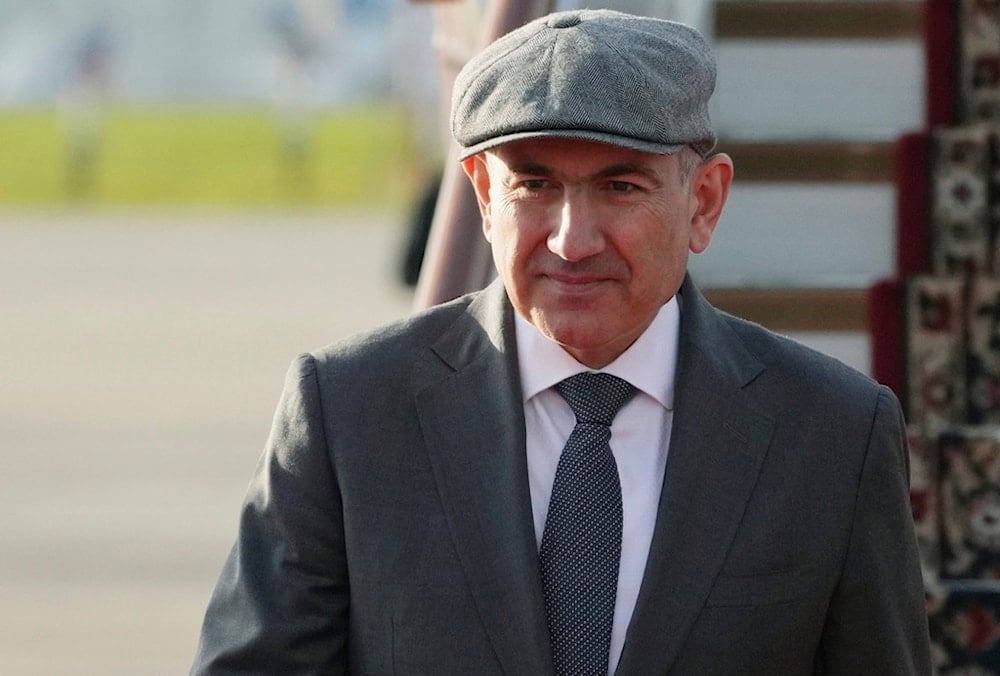Armenian Church demands release of Archbishop Ajapahian
The Armenian Apostolic Church condemned Archbishop Ajapahian’s arrest as political persecution, urging his immediate release and accusing the judiciary of bias.
-

Prime Minister of Armenia Nikol Pashinyan arrives in Moscow, Russia, Thursday, May 8, 2025, ahead of celebrations of the 80th anniversary of the Soviet Union's victory over Nazi Germany during the World War II (AP)
The Armenian Apostolic Church issued a forceful statement on Saturday demanding the immediate release of Archbishop Mikael Ajapahian, who was placed in pre-trial detention earlier in the day by a Yerevan court.
The court ruled that Archbishop Ajapahian, a senior cleric and outspoken critic of Prime Minister Nikol Pashinyan’s government, be held for two months. His lawyer, Ara Zohrabyan, denounced the decision as baseless and said an appeal would be filed promptly.
In a strongly worded statement, the Church condemned the ruling as “unjustified and illegal,” accusing the judiciary of yielding to political pressure.
'Political persecution'
“The steps taken against Archbishop Mikael are nothing more than political persecution and personal revenge of a man who considers himself a Christian and follower of the Armenian Church,” the statement read, in an apparent reference to Prime Minister Pashinyan.
The Church further urged the judiciary and relevant authorities to “act within the law and immediately release Archbishop Mikael Ajapahian.”
The arrest, according to the Armenian Apostolic Church, reflects a broader campaign by the Pashinyan government to suppress religious voices and marginalize the clergy. The Church characterized the move as part of a pattern of anti-church rhetoric and actions attributed to the Prime Minister since coming to power.
Coup plot involving bishop thwarted
Pashinyan announced on Wednesday that security forces had foiled a coup attempt allegedly involving a prominent cleric, escalating his long-running standoff with the Armenian Apostolic Church.
According to a statement posted on his official Telegram channel, Pashinyan claimed that law enforcement had disrupted “a large-scale and sinister plan" to "destabilize the situation in the Republic of Armenia and seize power."
Tensions between the government and the Church have been simmering since Armenia’s 2020 defeat in the Nagorno-Karabakh war. Catholicos Garegin II, the Church’s spiritual leader, has repeatedly called for Pashinyan’s resignation since then, criticizing his handling of national security and territorial concessions.
The latest confrontation centers on Archbishop Bagrat Galstanyan, a senior cleric and leader of the opposition Sacred Struggle movement. Galstanyan had led mass demonstrations last year against Pashinyan’s policies, accusing him of ceding Armenian land to Azerbaijan. While those protests did not succeed in unseating the prime minister, authorities now allege the archbishop pursued unconstitutional means to seize power.
A deeper institutional rift
Earlier this month, Pashinyan intensified his feud with the Armenian Apostolic Church by publicly calling on followers to remove Catholicos Garegin II from his post. During a heated exchange, the prime minister went so far as to accuse the religious leader of fathering a child, an allegation that provoked outrage among Church supporters and prompted calls for Pashinyan’s excommunication.
The Armenian Apostolic Church continues to wield considerable influence in the country’s cultural and political life. Recognized as the spiritual foundation of Armenia, widely known as the first nation to adopt Christianity as a state religion in the 4th century, the Church occupies a unique position under the constitution.
The alleged coup plot and the wider clash between Church and state now threaten to further destabilize an already polarized political landscape.

 3 Min Read
3 Min Read









